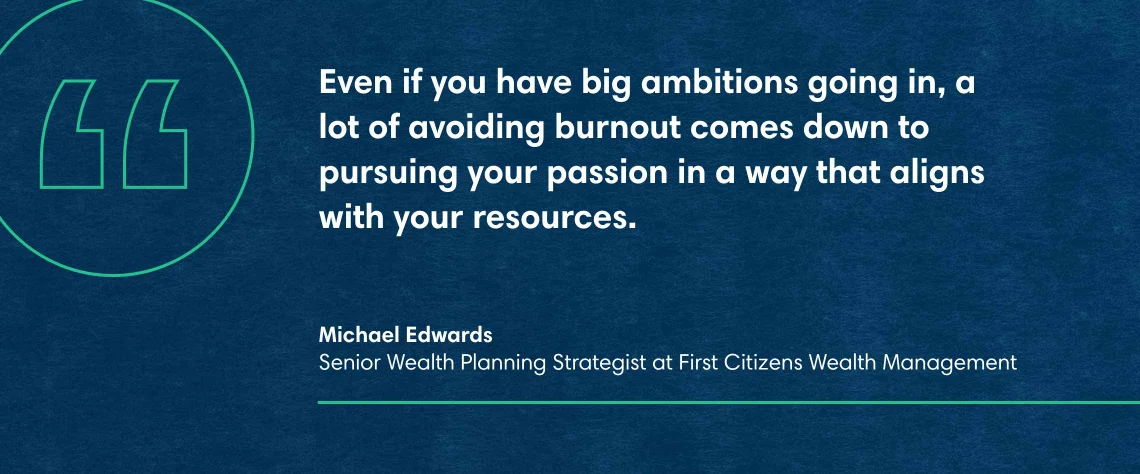Digital banking for business
Seamlessly access all of your accounts from one place with First Citizens Digital Banking for business.
Many people dream of turning a hobby or passion into a primary source of income. In a recent Business Week survey, almost 2/3 of people said they'd like to start a small business when they reach retirement age.

If you're still punching the clock, you may feel that the goal is too complicated—with family, social commitments and bills often making it risky or impractical. But if you've already exited the workforce, the situation may appear different.
With an empty nest, a solid retirement income plan and a surplus of free time, you face fewer obstacles toward making your passion a viable income stream. But even without these pre-retirement constraints, how achievable is it? The answer may depend on what you're hoping to get out of the business, as well as how much you're willing to put into it.
"As a hobby, what you love can be done on your own terms and timetable, but if you want to turn it into a supplemental income source, you have to weigh out the investment you'll need to make in terms of both time and money," says Michael Edwards, senior wealth planning strategist at First Citizens Wealth Management. "It's not strictly a case of having one or the other, but of merging the quantitative with the emotional—because if you can't accomplish both, you face the potential of a bust or a burnout."
When your passion is tied to income generation, pursuing what you love requires investments not just in money but energy as well—and will bring with it a certain sense of pressure to be successful that you may not feel if you're practicing your hobby for fun. Time constraints, income concerns and social commitments may have decreased following your retirement, but they didn't disappear.
Monetizing a passion project can also involve finding funding sources, book balancing, marketing and a host of other factors that run the risk of dampening your enthusiasm for your passion. Too little time spent on these considerations can imperil your finances, while too much time can create burnout.
"Alongside income, people have a variety of reasons for monetizing their passion, like wanting to challenge themselves mentally and physically after retirement—creating post-retirement social connections that replace relationships left behind at the office, for instance," Edwards says. "When you combine that with wanting a challenge, you end up with objectives much larger than pure earning potential. Motivations like this draw in multiple aspects of your life in a way that lessen the chances of burnout."
Even if creating a revenue stream is your sole focus, outside factors and concerns will drive your time and energy investments. Turning your passion into profit has a different meaning and requires a different approach at 59 than at 69. If your passion project proves successful, are you motivated to go on for a few years, a decade or even longer? How will changes in your personal health factor in? Will you need other people to help you, and how will their schedules fit with yours? To give your passion project the best chance of succeeding, consider these and other driving forces that intersect with your plans from the onset.
Resources play a big role in determining time investments. Selling handmade chairs online requires tools, materials, storage and—if you're successful—marketing and shipping plans to meet demand. Pulling together these resources and managing these plans can involve substantial time commitments. If you can't afford it, then teaching online courses to earn from your woodworking passion may be a better fit.
There may be value in testing your plan slowly, giving yourself an opportunity to earn while providing a litmus test for the amount of time and energy you can invest before approaching exhaustion. "Even if you have big ambitions going in, a lot of avoiding burnout comes down to pursuing your passion in a way that aligns with your resources," Edwards says. "Gradually dipping your toe into the pool before going all in is a good way to determine how much time you can afford to invest."

There are several financial considerations to make when it comes to turning your passion project into a post-retirement revenue stream, but three stand out: funding, taxes and liability.
Funding has a crucial impact on determining the shape your passion project will take. If you have a moderate amount of money to spend and limited time to commit, teaching a ceramics course is a great way to earn from your passion and requires little to no startup cost. But if you're looking to sell products online or open a brick-and-mortar business, you'll need to get plans down on paper and check them against your finances.
"Social Security, retirement account distributions, pension income, portfolio investments, rental income—you need a holistic view of everything on your balance sheet to determine what sources of funding make the most sense for your goal," says Edwards. "While it varies by situation, the overall rule is that the first two sources to look to for startup costs should be excess cash from a brokerage account or funds from a qualified account, especially a Roth IRA. Unlike the high interest rates you could pay if you took out a business loan, the first is subject to capital gains versus income tax, and with a Roth IRA, tax is already taken out."
It's critical to create an accurate accounting of your retirement finances in a best- and worst-case scenario when it comes to launching a venture. "Running those numbers against your ideas for a business is necessary not just to know how much you can spend but also to help prevent you from sinking investments you've worked hard to accumulate into a passion-based business that has the potential to drastically alter your retirement lifestyle if it fails," he notes.
"If you have a passion project plan before you retire, then you'll have a much better chance of handling taxes in an efficient way that helps with everything from funding and profits to management of qualified retirement plans," Edwards says.
For example, if you're planning to go straight from work to your passion project, you may still need income while you grow your venture. Edwards recommends converting a portion of a pretax retirement IRA or 401(k) into a Roth IRA to eliminate incurring taxable income from required minimum distributions—a tax strategy that can strengthen your ability to pursue a passion-based retirement well into your 70s.
Crafting a tax-efficient strategy may lead to more efficient management of other income streams as well. "If your tax strategy is solid and the income from your passion project is adequate to meet various financial needs, then making the decision to hold off on claiming Social Security benefits until 70 will be much easier, allowing you to maximize that source of guaranteed income," he says.
Of course, you should consult with a tax professional to shape your strategy and make sure all details are finalized correctly.
Addressing potential liabilities as you build your passion project is critical, particularly if it involves tools and manual labor or your earnings come in the form of a business. With one unfortunate event, the time and money you've placed into making your passion project financially viable and emotionally satisfying could vanish.
"Whether it's with taxes, funding, income, loans or injury, if you're turning your passion project into a business you need to evaluate what a worst-case scenario looks like and plan to meet it," says Edwards. "Part of that involves addressing underlying liability on the personal side and extending its realms to property, casualty and personal umbrella coverage."
Taking on a partner in your passion project may help spread the financial risk. No matter what form your business takes, you'll want to consider its legal setup. "If the project takes the shape of a business, then it really makes sense to safeguard personal assets by creating a separate entity like an LLC or S corporation to make sure you have business liability coverage in place," Edwards says.
If you're successful enough to pull in substantial profits after years of satisfying work, you'll need to address long-term strategies about what to do with the income. While there are several strategies for doing this, two considerations are paramount: How can some of this extra money be used to enhance your retirement years, and what will you do with the business when you can no longer run it?
"If there's excess income through your passion project, it's a good idea to start a separate retirement-type plan to defer some of those profits into a vehicle that keeps taxable income reduced," says Edwards. "Regarding a project that's a licensed business, as you extend into retirement, your health circumstances and family dynamics begin to change and you'll need to have a long-term plan for the company. Whether it's selling the business to a third party, transitioning it to employees or gifting it to loved ones, you'll want to have wills, trusts and operating agreements in order ahead of transfer."
A post-retirement passion project can benefit your finances, social life and sense of accomplishment. But it's important to remember that for it to be a success, a lot of planning and work will need to go into the process—even if it happens to be work you love.
"Whether your approach is big or small, planning for something like this isn't static at one given point in time," Edwards says. "Not only do you want to create a financial plan in advance of executing on a passion project, but you also want a plan that continues to adjust with your income and ambitions as each one grows."
Email Us
Please select the option that best matches your needs.
Customers with account-related questions who aren't enrolled in Digital Banking or who would prefer to talk with someone can call us directly.